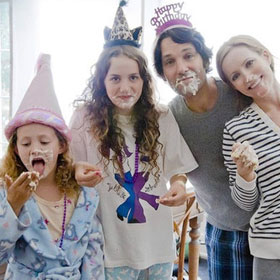'This Is 40' â Not 'Knocked Up' But A Step Closer

3.5/5
This Is 40 is not Knocked Up, the 2007 Judd Apatow-directed hit movie it has been loosely connected to as a “sort-of-sequel.” Where Knocked Up struck a fine balance between raunchy humor and serious subject matter (an unexpected pregnancy) by starting out hilarious and slowly drifting into a more dramatic film, This Is 40 jumps back and forth between comedy and drama as if the two genres were playing a heated game of ping pong. If anything, then, This Is 40 is most like Apatow’s last directorial effort, Funny People—darker than expected and a bit too long. It’s an important distinction to make because despite the certainty of the film’s title, This Is 40 never quite figures out its identity.
The movie was billed as a story about a married couple, Pete (Paul Rudd) and Debbie (Leslie Mann), who are wrestling with turning the big 4-0, and it’s bookended by their two birthdays, first Debbie’s and then Pete’s. But really, This Is 40 is less about coping with aging—Pete seems to have no trouble with the milestone–than it is about being married for a long time. It should have been called This Is Marriage with Children, as much of the movie is devoted to screaming matches between Pete and Debbie and their two daughters, Sadie (Maude Apatow) and Charlotte (Iris Apatow).
However, while the big picture wanders, This Is 40 has its moments, and it is the little things that save the film. There are outstanding small appearances by Melissa McCarthy as a disgruntled and foul-mouthed parent from Sadie’s middle school, and Chris O’Dowd and Lena Dunham as a pair of Pete’s employees at his struggling record label. And it is also worth mentioning Rudd and Mann who, after so many funny performances, can be taken for granted whenever they deliver another solid turn. Rudd, with his boyish face and casual demeanor, and Mann with her is-she-no-isn’t-she-wait-yes-
The definitive moment in this movie of little moments comes near the end, at Pete’s 40th birthday party. Debbie makes a toast to the family and friends seated at the table, and in doing so she takes a dig at Pete’s manipulative father (Albert Brooks) and her own biological father (John Lithgow), who has been absent from much of her life and now has his hands full with his own young family. Following the offensive toast, Debbie's father gets up from the table and appears to leave for good.
The camera then cuts back to the party and the people singing "Happy Birthday" to Pete in front of his cake. As they sing the camera zooms in on Debbie’s face, empty and sad, and then shoots across the crowd to the back of the party where her father, absent for so many years, is still standing there.
“He stayed,” someone next to me in the theater whispered.
The camera only lingers for a brief second, but Apatow’s handling of that moment injects the film with more heart in less than two seconds than the previous two hours combined. Knocked Up and The 40 Year-Old Virgin were so successful in part because they weren’t just funny, they touched on something genuine—our insecurities. Funny People seemed like a step back, and perhaps it was, but it felt like Apatow was striving to push beyond the regular confines of a “Judd Apatow movie” (hilarious, talented cast, surprisingly good soundtrack) with a more dramatic film, and while I was left unsatisfied by it I believed Apatow was on to something.
This Is 40 could have been the next leap for Apatow as a filmmaker, as I fully expected it to be. And while it isn’t, it’s also not another pawn in the stagnant reproduction of the same movie over and over again. To Apatow's credit as an evolving storyteller, I can’t remember a single moment off the top of my head from any of his prior movies that was as touching as that brief shot of John Lithgow standing in the back of a crowded party holding a glass of white wine.
So what, exactly, is This Is 40? It’s one small step closer.
RELATED ARTICLES
Get the most-revealing celebrity conversations with the uInterview podcast!





Leave a comment